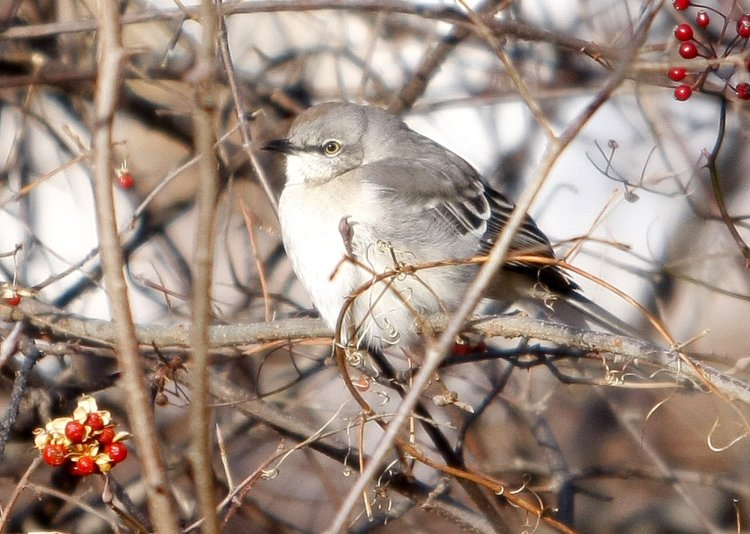I am delighted that at least three pairs of Northern mockingbirds are nesting in my neighborhood in Waterville. When we moved to Maine in 1990, this species was essentially absent from central Maine. The species has been spreading north over the past quarter of a century. Mockingbirds are quite common in North Carolina where I grew up, and it’s nice to have these old acquaintances around in Maine.
I checked out the Northern mockingbird page on the Maine Bird Atlas website to see the current distribution of mockingbirds in the state. In central Maine, the birds show a very patchy distribution. Their presence is associated with urban areas. I see islands of mockingbirds around Lewiston/Auburn, Augusta, Waterville, Orono/Old Town and Dover-Foxcroft. Mockingbirds don’t tend to come to feeders much. I think the presence of mockingbirds in towns and cities has more to do with habitat alteration. Mockingbirds like the sparsely vegetated yards of suburban environments and avoid forested landscapes.
Northern mockingbirds belong to the mimic-thrush family, the Mimidae. The name comes from the ability of these birds to mimic the vocalizations of other birds. We have three mimic-thrushes in the state (gray catbird, brown thrasher and Northern mockingbird). The three species are easy to tell apart by eye, as a glance at your field guide will demonstrate. Telling them apart by voice is as easy as one, two, three. Gray Catbirds sing the various songs of their repertoire just once before moving on to the next. Brown thrashers sing their songs in pairs and Northern mockingbirds sing each song thrice.
Northern mockingbirds are the most skilled mimics of these three species. It’s amazing to hear a single bird sing spot-on versions of blue jay, red-shouldered hawk, tufted titmouse, Eastern towhee, killdeer, Northern cardinal, white-breasted nuthatch and others in quick succession.
Sometimes a mockingbird will mimic the song of a bird not found locally. For instance, a Northern mockingbird in Austin, Texas, was heard imitating a green jay, whose closest population is along the Rio Grande, over 300 miles away. Perhaps the mockingbird had spent time in the Rio Grande region or perhaps it learned the song from other mockingbirds who passed it northward over time.
A male Northern mockingbird may have over 150 songs in its repertoire. The repertoire may change over time and generally gets larger with age.
So, what is the advantage of such virtuosic mimicry? It seems clear that mockingbirds are not trying to deceive other birds. Rather, the size and diversity of a male’s repertoire is probably important in attracting mates. Females are impressed by a male with a large repertoire.
The starling family also has many species that are gifted mimics. The introduced European starling is a remarkable mimic. Pet starlings can be readily taught to mimic human speech. From DNA analysis, we know that the starling and mimic thrush families are closely related so their ability to mimic other sounds likely first appeared in the common ancestor of the two families.
Vocal mimicry is surprisingly widespread in the songbirds. Over 20% of the roughly 5,000 songbirds are known to mimic other birds. Males in the majority of these species must learn their species-specific song from their father or other tutor so the ability to mimic is not surprising.
Sometimes, young males learn the wrong song. Examples in North America include a Vesper sparrow singing the song of a Bewick’s wren and a chestnut-sided warbler singing the song of an indigo bunting. Of course, their plumage and song don’t match so birds singing the wrong song have no chance of acquiring a mate.
Blue jays can be a bit devious in their mimicry. Some do a wonderful imitation of a red-shouldered hawk. That vocalization causes birds at a feeder to flee for their lives, giving the blue jay the feeder to itself.
Herb Wilson taught ornithology and other biology courses at Colby College. He welcomes reader comments and questions at whwilson@colby.edu.
Send questions/comments to the editors.



Success. Please wait for the page to reload. If the page does not reload within 5 seconds, please refresh the page.
Enter your email and password to access comments.
Hi, to comment on stories you must . This profile is in addition to your subscription and website login.
Already have a commenting profile? .
Invalid username/password.
Please check your email to confirm and complete your registration.
Only subscribers are eligible to post comments. Please subscribe or login first for digital access. Here’s why.
Use the form below to reset your password. When you've submitted your account email, we will send an email with a reset code.